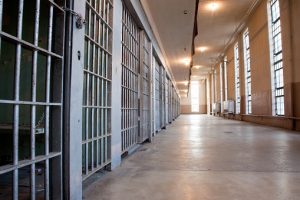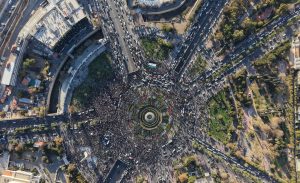
The outbreak of the coronavirus has highlighted the flaws of the United States’ institutions. The healthcare system, for example, has become overwhelmed after the influx of patients who have contracted COVID-19. The flaws of the American criminal justice system have been exposed in past catastrophes and will likely be exposed yet again during the coronavirus pandemic. Hurricane Katrina was a natural disaster that caused an immense amount of stress for prisoners stuck in ill-prepared correctional facilities. By assessing past mistakes, the criminal justice system can improve its service for its communities.
The impact of the coronavirus on the incarcerated population depends on the preparation counties have made for the outbreak of viruses. Currently, the United States has an incarcerated population of about “2.3 million people.” The large population shares many facilities on a daily basis such as bathrooms and cells. With the combination of shared facilities and inadequate air ventilation, the coronavirus will likely have a negative impact on those currently incarcerated. If no action is taken by jails and prisons, then they will potentially help the spread of the coronavirus rather than assisting in the decrease of infections. Inmates who are exposed to poor air ventilation might develop health conditions that could leave them at a high risk for serious illness if infected with the virus. Those who already had underlying health conditions are also at risk after being exposed to poor conditions. The current pandemic has highlighted issues in the correctional system such as paying prisoners extremely low wages for their labor. Governor Andrew Cuomo revealed that New York State was producing its own hand sanitizer that was being produced in a correctional facility. The prisoners responsible for producing this product were paid less than a dollar for an hour of their labor. If states require more products to assist in the pandemic, then prisoners will likely continue to be taken advantage of.
It is also important to note that health care in correctional facilities has been founded to be faulty. CBS News conducted an investigation and discovered inmates were denied medical attention that could’ve prevented their deaths. In 2016 an inmate, Dante Wilson, was given Tums after reporting chest pains, was ignored the second time he reported the same pain, and eventually died after suffering from a heart attack. The investigation found several other similar cases where the company providing medical care to correctional facilities played a role in the preventable deaths of inmates. The health care available to inmates, which is known to be faulty, will also determine the impact of the virus on the incarcerated.
Some counties created plans for their jails and prisons if an outbreak of a virus occurred. New York City is one example of a city that formed a course of action in response to the coronavirus. New York City plans on testing individuals for “flu like symptoms” before they are put into a group cell. Those who exhibit those symptoms will be sent to a separate center for treatment. Arguably, those actions may not be enough. One measure that could be more effective is releasing some prisoners to reduce the congestion in those facilities. Those who have underlying health conditions, therefore are at a higher risk, should be released. Along with those individuals, inmates who are older should be considered for release too. The recidivism rate for ex-inmates who are age 50 or older and have served years in prison is relatively low. The public might not entirely agree with that action, so alternative programs to incarceration should be developed following the guidelines of preventing the spread of coronavirus. The dignity of inmates should be respected during this pandemic and others that may follow. The criminal justice system can learn from the poor treatment of inmates during Hurricane Katrina and make sure that treatment is not repeated.
Inmates at New Orleans jails and prisons suffered greatly during Hurricane Katrina. The National Prison Project of the American Civil Liberties Union (ACLU) noted that when the facilities lost power, inmates were left to sit in the dark enduring breathing difficulties because of poor ventilation and severe flooding of their cells. The lack of preparation caused the incarcerated to withstand days without food and updates from correctional staff who deserted their stations. Those inmates should not have been forced to go through that terrible situation. Jails and prisons need to assess the effect poor preparation had on inmates. If plans for a time of an outbreak were not already made, jails and prisons need to act fast to avoid the coronavirus pandemic affecting current inmates similarly. Correctional staff and inmates need to be knowledgeable on the virus and know the proper steps to take if someone becomes infected. If correctional facilities ensure they have enough food, protective equipment such as masks for inmates, and adequate health care measures for inmates, then the suffering caused by the ill-prepared correctional facilities during Hurricane Katrina will not be repeated.
Issues of race, class, and gender will likely contribute to certain communities being more vulnerable to the virus. Communities of color and poorer communities in America have been subjected to “redlining, environmental racism, and [a] wealth gap.” Those circumstances have led those communities to poor housing units that may foster underlying health conditions, leaving people at a higher risk for suffering greatly from the virus. Income plays a role as those who are more financially secure can afford to stay home from work while others from poorer backgrounds still need to work during this time. A survey about coronavirus concerns highlights gender issues as well. In the survey, more women with children compared to men with children are concerned about losing income during this time and admit to being more likely to expose themselves to the virus for work. These issues of race, class, and gender will likely affect the incarcerated as well. African Americans have been incarcerated at high rates due to being targeted by police. Some inmates during the Hurricane Katrina disaster were imprisoned because they could not afford to pay their legal fees or other fines. Women in prisons have reported being denied necessary medical care by prison officials. Inmates from those demographics might suffer greatly during this pandemic because of the correctional system’s history of dismissing their best interest. Women experiencing symptoms might be ignored and denied proper treatment and African Americans might be overlooked if any plans of release to counteract the coronavirus is considered. With the economic turmoil and trauma surrounding this pandemic, there will be new pathways to incarceration. Those who are affected negatively by the virus and continue to struggle once the pandemic is over, might turn to criminal behavior as a way to ease their suffering.
The coronavirus has impacted several communities. Those who are incarcerated is one population that needs consideration when making plans to combat the spread of the virus. Jails and prisons need to prepare themselves, if they haven’t already, for protecting inmates. Past mistakes from disasters such as Hurricane Katrina serve as a model of all the wrongs that need to be fixed in the current criminal justice system.
Sources:
https://www.nytimes.com/2020/03/16/opinion/coronavirus-in-jails.htmlhttps://abcnews.go.com/Health/prison-inmates-ny-produce-100k-gallons-hand-sanitizer/story?id=69501815https://www.cbsnews.com/news/broken-jail-healthcare-system-poses-danger-behind-bars/https://journals.sagepub.com/doi/10.1177/0306396807080069https://www.dailymail.co.uk/news/article-8186551/AOC-demands-coronavirus-reparations-black-brown-communities-hit-hardest-disease.htmlhttps://www.kff.org/womens-health-policy/issue-brief/coronavirus-a-look-at-gender-differences-in-awareness-and-actions/





Comments are closed.